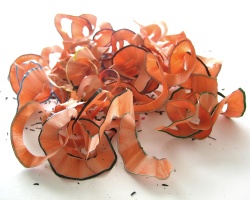Mac laughs at this (frequently, and with disbelief, I’m afraid), but I am strangely attracted to …antiquarians. Alan Alda on Scientific American is awfully cute, and he’s, what, seventy? And I think Patrick Stewart is running neck and neck with Sean Connery these days in the field of distinguished relic hottiness. (How bizarre that 007 is older than my grandma.) Richard Peck I practically stalked at a writing conference one year, and I got all swoony when he smiled at me (He was probably thinking, “Where is there a house line so I call security? There’s a short Colored girl following me…)(and YES, “Colored” is probably from his era [Negress? – that one always makes me think of tall white birds!], though I am joking. He probably thought I was someone’s kid wanting an autograph.). Yes, my bad boys are all old boys recalling their glory days, maybe that’s why I like them… at least it means I won’t stray when Mac is old and wrinkled (ha! Which I shall be BEFORE him, I am sure).
Another of my favorite old men is …Garrison Keillor. He’s not really old enough yet to be on the Old Men of Awesomeness list, but he’s …Garrison Keillor, which is enough. If you haven’t gone to his website for A Prairie Home Companion, you’ll at least want to check out his Writer’s Almanac which this month has a daily poem, and lists birthdays of the greats, and comes in a handy podcast.
This snippet of Mr. Keillor‘s thoughts on attitude of artists (and poets in particular) makes me laugh.
Conviviality is no small achievement. Back when I was young, most major American writers seemed to be alcoholic or suicidal or both, and we students absorbed the notion that the true sign of brilliance is to be seriously screwed up. The true poet is haunted by livid demons, brave, doomed, terribly wounded, and if one was (as I was) relatively unscratched, you concealed this and tried to impersonate doom.
The prime minister of high culture was T.S. Eliot, who suffered from a lousy marriage and hated his job and so wrote “The Love Song of J. Alfred Prufrock,” a small, dark mopefest of a poem in which old Pru worries about whether to eat a peach or roll up his trousers. This poem pretty much killed off the pleasure of poetry for millions of people who got dragged through it in high school. The first line of “Prufrock,” as you may recall, was “S’io credesse che mia risposta fosse” — he opened with six lines of a language 99 percent of his readers do not understand! How better to identify yourself as a serious poet than to be incomprehensible?
When I grew safely past adolescence and started getting published, my mother actually  encouraged me to be weird. Every strange hat or striped and spangled pair of tights my mother would nod and say, “You look just right. Artistic.” I’ve had people take me aside and exhort me never to let Mac cut his hair or lose his piercings. “Don’t tame him too much,” has been the (elderly person) comment. How bizarre that some believe we must be ponderous and obscure to serve Art.
encouraged me to be weird. Every strange hat or striped and spangled pair of tights my mother would nod and say, “You look just right. Artistic.” I’ve had people take me aside and exhort me never to let Mac cut his hair or lose his piercings. “Don’t tame him too much,” has been the (elderly person) comment. How bizarre that some believe we must be ponderous and obscure to serve Art.
Equally how bizarre that some people are living vicariously through our weirdness, but that, friends, is another post entirely…
ps – There is one cute old man in this picture. It’s not the Gubernator, despite the fact that he, too, is older than dirt.
 A fascinating find on display at the Oakland
A fascinating find on display at the Oakland  his teacher since he’s suddenly not speaking to me anymore, but hey, these things happen. Meanwhile, three cheers for Rod Septka, a rising star in the Marin school system, who was always one of the canniest and funniest people at Mills College and who worked harder than many of us getting his MFA while also getting his MA, if I recall correctly, and
his teacher since he’s suddenly not speaking to me anymore, but hey, these things happen. Meanwhile, three cheers for Rod Septka, a rising star in the Marin school system, who was always one of the canniest and funniest people at Mills College and who worked harder than many of us getting his MFA while also getting his MA, if I recall correctly, and 


